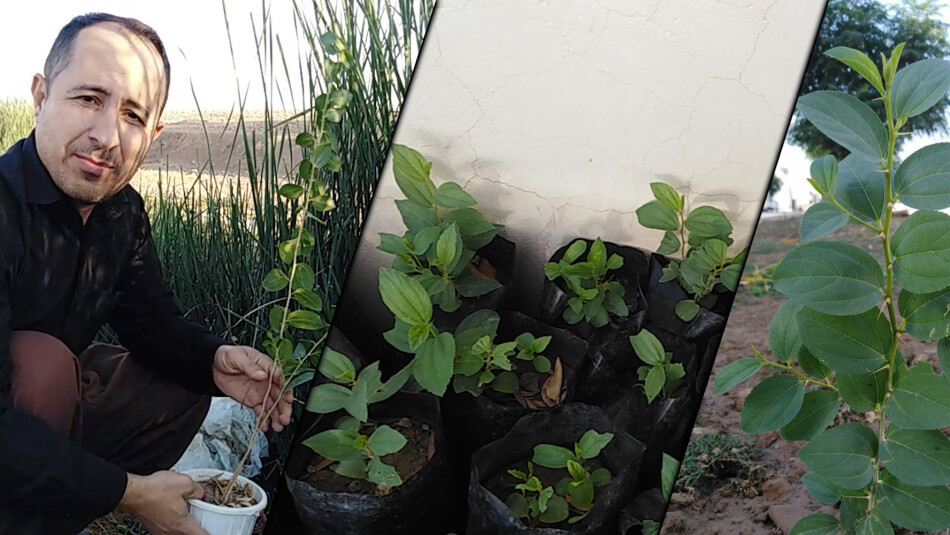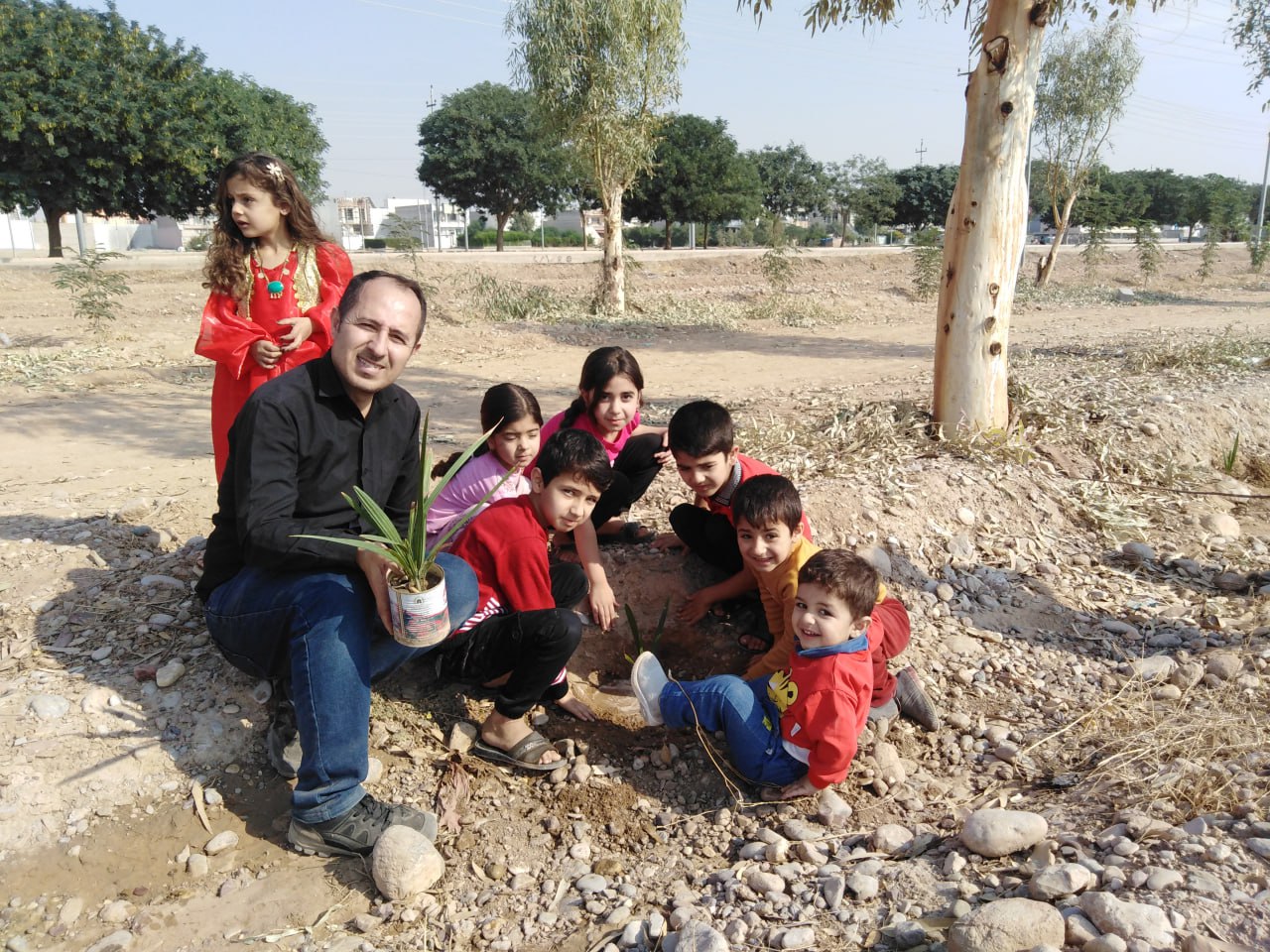
A section of Ali Nader's trees reached a height of two meters, fulfilling a childhood dream of increasing green spaces. This individual initiative is being carried out in the Rizgari subdistrict, where the percentage of greenery is less than 5%.
Nader, a young man living in Rizgari, which is part of the Kalar district in the Garmian administration, aims to increase the percentage of green spaces in two of Garmian's districts. He began his volunteer mission two years ago, during which he planted more than 1000 "Jujube" trees.
Nader plants Jujube tree seeds in his home and cares for them until they become seedlings, which he then plants in the Rizgari and Bawa Noor sub-districts.
Fulfilling a Childhood Dream
Nader shares that his love for trees and greenery has been with him since childhood.
"When I was young, I used to visit the village where I was born a lot in the summer, and I used to think about how to make this area green."
Now, as a young man, he wants to make that dream a reality.
Years ago, he began consulting with experts and specialists to determine the type of trees suitable for the Garmian environment, and they suggested the Jujube tree.
As a primary school teacher who also works as an English translator, he surfed some research on the Jujube tree.
"It became clear to me that the Jujube is the ideal tree for the Garmian environment because it has the ability to withstand harsh (hot) weather."
The Garmian region, which includes three sub-districts and is an administration affiliated with the Sulaymaniyah Northern Province, is known for its high temperatures in the summer and low rainfall in the winter, making it a challenging environment for greenery.
Abdul Mutalib Rifaat, an environmental expert and professor at Garmian University, notes that the environmental conditions in Garmian are "poor", aside from the presence of the Sirwan River.

"The percentage of greenery is low, and protecting and caring for the environment has not become a cultural norm. Some people destroy their environment for personal gain, and there is a lack of awareness on the issue," Rifaat said.
IQAir, a Swiss company working in the field of air quality technology, states Iraq's air is among the "most polluted" in the world.
According to the Ministry of Health of the Kurdistan Regional Government, environmental pollution is one of the causes of cancer, with 9,911 cases recorded in 2023, and lung cancer being the second most common case.
Nader's initiative coincides with the unfortunate reality of green spaces in the Garmian administration, as figures and data for 2023 indicate that the percentage of greenery in 16 municipalities affiliated with the administration was only 5.7%, much lower than the global standard of at least 30%.
"The percentage of greenery in the center of the Kalar district is 10%, and it is less than 7% in other areas," Rifaat said, emphasizing the importance of planting trees in combating climate change.
According to United Nations reports, Iraq is ranked fifth among the countries most affected by the repercussions of climate change.
Khanaqin district, adjacent to the borders of the Garmian administration, has a similar environment and climate.
"The first step to adapting and reducing the effects of climate change begins with planting trees," Rifaat added.
Voluntarily planting trees is crucial to preserving the environment. Planting 1,000 seedlings leads to an increase in green spaces as Garmian suffers from a lack of vegetation cover.
Ayad Muhammad, an environmental activist in Garmian, said, "There are many environmental problems in Garmian, such as the lack of a green belt in the south to repel dust storms, and the burning and distortion of the environment of the Sirwan River, which is an oxygen production factory.”
“Housing projects have caused significant damage to Garmian's environment by not allocating specified areas for greenery," he added.
A Step to Address Concerns
Nader launched his initiative in 2022. He would visit the banks of the Sirwan River in his private car to collect soil samples from an area called "Dahla".
He then buys special bags for planting seedlings and plants the seeds of the Jujube tree in his home, caring for them until they become seedlings.
“When it’s time to plant the seedlings, I ask the Rizgari municipality to designate a location for them,” Ali added. “Over the past two years, I’ve planted at least 1,000 Jujube trees.”
“My main goal from the project, in addition to afforestation, is to spread a message to young people and children to be environmental protectors, at least not to become part of the causes of environmental destruction.”
Environmentalists highly appreciate the individual and voluntary initiative of Nader.
“Voluntarily planting trees is an important act to preserve the environment. Planting 1,000 seedlings increases green spaces because Garmian suffers from a lack of vegetation,” Rafat said.
Sabiha Muhammad (48 years old), a teacher living in Rizgari, said, “What Ali Nader is doing is sacred. When I first learned that he planted these trees, I volunteered to water them. I wanted them to grow and for us to enjoy their shade, but they told me that they didn’t need watering because this type of tree needs a small amount of water.”
“I’m happy with what he did and I always mention him to my students as a role model.”
Environmental activist Ayad Muhammad pointed out that he is aware of what Ali does, "It's a sense of responsibility towards the environment and the soil. All the effort is on him, but the benefit is shared by everyone."
The Jujube Tree is More Suitable for the Environment of Garmian
The Jujube tree that Nader chose, some of which has now reached a height of two meters, is a species that can withstand climate change and grow in different environments. It needs little water, which is crucial due to the lack of rainfall in Garmian.
The Jujube, also known as the Sidr, Nabq, or Christ's thorn, is characterized by its roots penetrating deep into the soil. The Jujube is a thorny tree that can withstand winds, drought, thirst, and high levels of salts in the soil.
The presence of large amounts of carbohydrates in its roots helps it endure, and the tree also has the ability to repair damage caused to it, such as fires, according to Nader's follow-ups. Ali says, "The importance of this tree for Garmian lies in its ability to adapt to high temperatures, as it also grows in desert areas where the annual rainfall ranges between 50 to 300 mm.
The Jujube tree is also a fruitful tree, and its fruits are used as food and a source of income, as well as fodder for livestock.
The environmental expert and professor at Garmian University believes that it is important to plant fruitful trees alongside non-fruitful trees, especially in alleys and on sidewalks, because they make citizens preserve them for their fruits.
The Jujube fruits are sold in the market as a type of fruit, the tree's leaves are a good source of fodder for livestock, and its thorny branches are used to erect fences, while its roots are a good source of charcoal as fuel.
"The trunk of the Jujube tree is very strong, so it is used to make doors, windows, and home furniture," Nader says.
On the other hand, this tree prevents the soil from being eroded and collapsing, "because its roots reach deep into the soil" and contribute to its fertilization.
All these benefits and advantages prompted Nader to choose the Jujube tree from among thousands of species to make his initiative a success.
"Establishing dense forests of Jujube trees around the villages leads to mitigating the natural disaster facing Garmian, especially the risks of desertification."
Jader Ali (60 years old), a resident of the Rizgari sub-district, said, "I remember when I planted a few trees here last year, I did not expect them to grow this way."
The Step Was Not Without Challenges
Nader explained that implementing his initiative was not easy, especially in a society that lacks awareness about caring for the environment and green spaces.
"One of the problems that threatens the trees and environment of Garmian is the presence of livestock and poultry within cities. The administrations of these areas have been helpless in addressing this issue."
The mayor of the Rizgari sub-district, Arslan Ahmed, acknowledged this phenomenon but mentioned that it is on the decline.
According to statistics from the General Directorate of Municipalities of Garmian, there are 243 large parks and gardens in Garmian.
Regarding Nader's initiative, the mayor of Rizgari said, "What he is doing is wonderful and beneficial to the environment. He is constantly concerned with the environment of the region, but he plants these trees without our knowledge, so he faces some problems. He must inform us in advance so that we can determine the locations for him, protect, and care for them."
Ahmed hinted that the municipality is currently unable to increase the percentage of green spaces and that their efforts are focused on maintaining the existing percentage, "because we lack the cadres and need mobile water tanks."
Iyad Muhammad said, "Some people do not pay attention to Ali Nader's efforts, so they break or uproot trees."
Nader's initiative is driven by individual effort, but he sometimes receives help from some of his friends while planting trees.